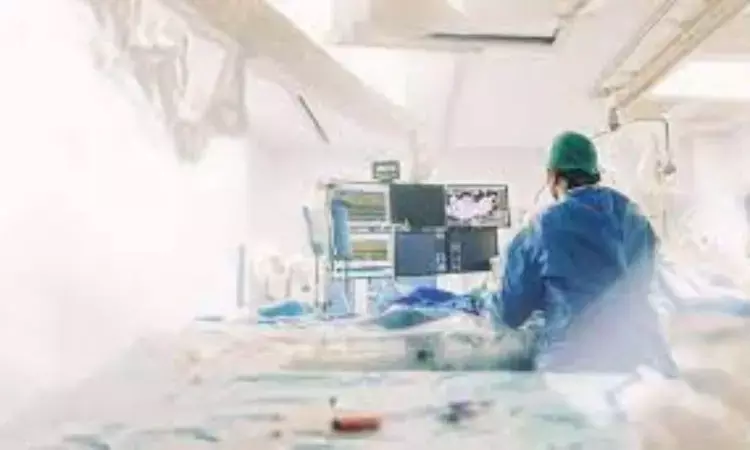- Home
- Medical news & Guidelines
- Anesthesiology
- Cardiology and CTVS
- Critical Care
- Dentistry
- Dermatology
- Diabetes and Endocrinology
- ENT
- Gastroenterology
- Medicine
- Nephrology
- Neurology
- Obstretics-Gynaecology
- Oncology
- Ophthalmology
- Orthopaedics
- Pediatrics-Neonatology
- Psychiatry
- Pulmonology
- Radiology
- Surgery
- Urology
- Laboratory Medicine
- Diet
- Nursing
- Paramedical
- Physiotherapy
- Health news
- Fact Check
- Bone Health Fact Check
- Brain Health Fact Check
- Cancer Related Fact Check
- Child Care Fact Check
- Dental and oral health fact check
- Diabetes and metabolic health fact check
- Diet and Nutrition Fact Check
- Eye and ENT Care Fact Check
- Fitness fact check
- Gut health fact check
- Heart health fact check
- Kidney health fact check
- Medical education fact check
- Men's health fact check
- Respiratory fact check
- Skin and hair care fact check
- Vaccine and Immunization fact check
- Women's health fact check
- AYUSH
- State News
- Andaman and Nicobar Islands
- Andhra Pradesh
- Arunachal Pradesh
- Assam
- Bihar
- Chandigarh
- Chattisgarh
- Dadra and Nagar Haveli
- Daman and Diu
- Delhi
- Goa
- Gujarat
- Haryana
- Himachal Pradesh
- Jammu & Kashmir
- Jharkhand
- Karnataka
- Kerala
- Ladakh
- Lakshadweep
- Madhya Pradesh
- Maharashtra
- Manipur
- Meghalaya
- Mizoram
- Nagaland
- Odisha
- Puducherry
- Punjab
- Rajasthan
- Sikkim
- Tamil Nadu
- Telangana
- Tripura
- Uttar Pradesh
- Uttrakhand
- West Bengal
- Medical Education
- Industry
Additional low-voltage-area ablation lowers ATA recurrence risk in elderly with paroxysmal AF: JAMA

China: Additional low-voltage-area (LVA) ablation beyond circumferential pulmonary vein isolation (CPVI) reduced the recurrence of atrial arrhythmias in older patients with paroxysmal atrial fibrillation (AF) by 39% at 23 months, a randomized clinical trial has shown. The findings appeared in the journal JAMA Cardiology on June 28, 2023.
The researchers note that in the population of older patients with paroxysmal AF, the prevalence of LVA was as high as 41.4%, with an average burden of 7.2%. This benefit was consistent in subgroups except for a more significant advantage in women than in men, possibly due to the higher prevalence and burden of LVA in women.
Recent studies have shown that successful catheter ablation of AF improves long-term clinical outcomes regarding the composite endpoint of stroke, cardiovascular death, and hospitalization due to heart failure. For decades, research has been done on improving the success rate of AF ablation. Till now, research regarding LVA ablation beyond CPVI has shown inconsistent results.
The authors believed that a factor accounting for the inconsistent results is the heterogeneity of patient selection regarding the extent and presence of LVA. Therefore, defining the subset of patients with atrial fibrillation who may benefit from LVA ablation is crucial. The overall success rate of circumferential pulmonary vein isolation treatment in paroxysmal atrial fibrillation patients remains suboptimal, particularly in older patients.
Against the above background, Hongwu Chen, First Affiliated Hospital of Nanjing Medical University, Nanjing, China, and colleagues explored the incremental benefit of low-voltage-area ablation after CPVI in older patients with paroxysmal AF in a single-blind multicenter randomized clinical trial.
They compared the efficacy of additional low-voltage-area ablation beyond CPVI versus CPVI alone in older patients with paroxysmal AF. Participants included were aged 65 to 80 years with paroxysmal AF referred for catheter ablation across 14 tertiary hospitals in China.
Four hundred thirty-eight patients were randomized in a ratio of 1:1 to undergo CPVI plus low-voltage-area ablation or CPVI alone. Low-voltage areas were defined as areas with an amplitude lower than 0.5 mV in more than three adjacent points. Additional substrate ablation was performed in the CPVI plus group if the low-voltage areas existed, but not in the CPVI alone group. The patients' mean age was 70.5 years; 50% were men, 24 did not complete the blanking period and were not included in the efficacy analysis.
The study's primary endpoint was freedom from atrial tachyarrhythmia as revealed by ECG (electrocardiogram) during a clinical visit or lasting more than 30 seconds during Holter recordings after a single ablation procedure.
The authors reported the following findings:
- After a median follow-up of 23 months, the recurrence rate of atrial tachyarrhythmia was significantly lower in the CPVI plus group (15% patients) compared with the CPVI alone group (24% patients; hazard ratio [HR], 0.61).
- In subgroup analyses, among all patients with low-voltage areas, CPVI plus substrate modification was associated with a 51% decreased risk of ATA recurrence compared with CPVI alone (HR, 0.49).
"This study found that compared to CPVI alone, additional low-voltage-area ablation beyond CPVI decreased the ATA recurrence in older patients with paroxysmal AF," the researchers wrote.
"Our study warrants further replication to translate our findings to clinical practice," they concluded.
Reference:
Chen H, Li C, Han B, et al. Circumferential Pulmonary Vein Isolation With vs Without Additional Low-Voltage-Area Ablation in Older Patients With Paroxysmal Atrial Fibrillation: A Randomized Clinical Trial. JAMA Cardiol. Published online June 28, 2023. doi:10.1001/jamacardio.2023.1749
Dr Prem Aggarwal, (MD Medicine, DNB Medicine, DNB Cardiology) is a Cardiologist by profession and also the Co-founder and Chairman of Medical Dialogues. He focuses on news and perspectives about cardiology, and medicine related developments at Medical Dialogues. He can be reached out at drprem@medicaldialogues.in
Dr Kamal Kant Kohli-MBBS, DTCD- a chest specialist with more than 30 years of practice and a flair for writing clinical articles, Dr Kamal Kant Kohli joined Medical Dialogues as a Chief Editor of Medical News. Besides writing articles, as an editor, he proofreads and verifies all the medical content published on Medical Dialogues including those coming from journals, studies,medical conferences,guidelines etc. Email: drkohli@medicaldialogues.in. Contact no. 011-43720751


